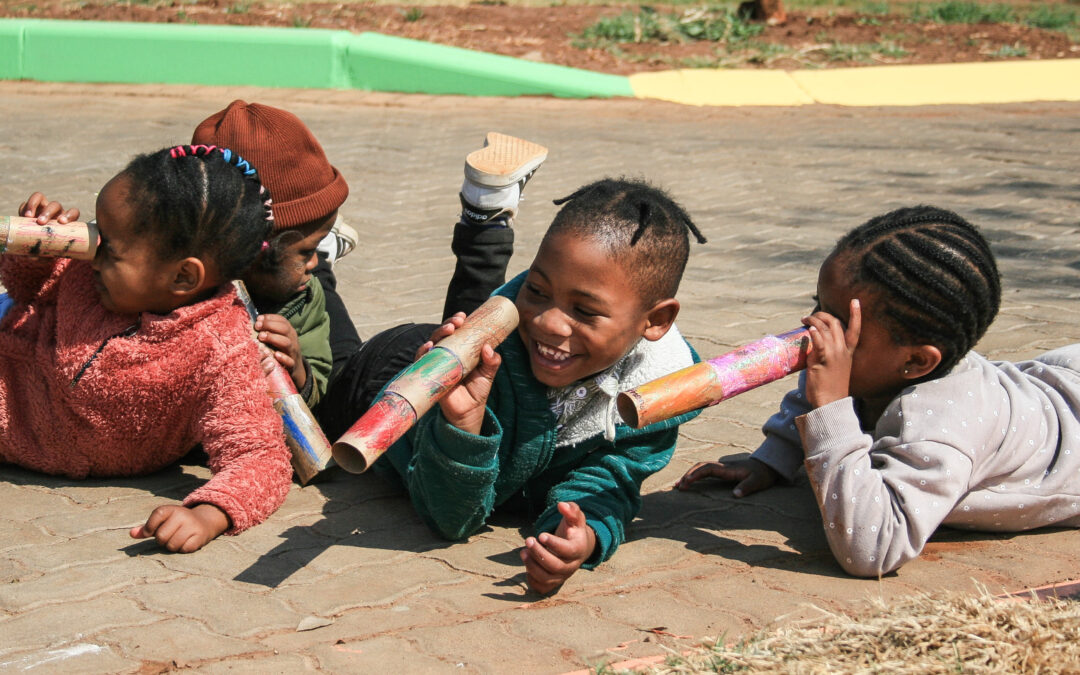In today’s fast-paced world, technology is everywhere! For many families, screens have become an easy go-to for keeping little ones entertained. According to a recent report, forty percent of toddlers have their own tablet by the time they are 2 years old.
While digital devices can offer some educational value, too much screen time can reduce the opportunities children have for real-world exploration, active play, and, most importantly, meaningful connection with others.
At Earlybird Educare, we’re passionate about the importance of these early connections. That’s why our approach to early learning blends thoughtful use of technology with a strong foundation in play-based learning — because we know that real growth happens through doing, exploring, and connecting.
Our Approach at Earlybird
Yes, we’re tech-forward, but screens should never replace human connection. Instead, technology, in the form of our Bird Seed app, is one of many tools we use to support our play-based learning programme, which includes:
- Free-choice sessions where children explore their own interests through child-led play.
- Teacher-led small-group and whole-class activities that are intentionally planned and target specific developmental goals.
- A curriculum arranged around biweekly themes and focused on three broad learning and development areas.
This balanced approach encourages both independence and guided learning, and gives children the structure and freedom they need to thrive.
Easy, Screen-Free Activities for Parents to Try at Home
We know it’s not always easy to come up with screen-free activities — especially at the end of a long day.
Here are a few simple, low-prep ideas that promote connection and creativity at home:
The Box Game
Grab a few empty cardboard boxes, a roll of sticky tape and let your child decide what it will become — a rocket? A castle? A car? You’d be amazed at the power of imagination (and how long a cardboard box can keep a child busy!).
Family Dance Party
Turn on some music, turn off the lights, and dance like no one’s watching! Great for bonding, burning off extra energy and an instant mood lifter!
Story Swap
Instead of reading a story, make one up together. You start the first line, your child adds the next, and so on. The sillier, the better!
Nature Treasure Hunt
Whether it’s a walk in the garden or a visit to the park, give your child a “treasure list” of things to find outside: a yellow leaf, a round stone, something that smells good – the options are endless. Apart from the joy of ticking off the checklist treasure hunt items, the fresh air and quality time outside will do everyone wonders. Cold and rainy? Simply adjunct the list for indoor household items.
Cook Together
Involve your child in preparing a simple meal or snack. Measuring, pouring, and stirring are great ways to practice fine motor skills — and children are more likely to try something they helped make!
Sock Puppets & Puppet Shows
Turn old socks into puppets using markers, buttons, or scraps of fabric. Then put on a silly show together!
Loose Parts Play
Gather safe household items like bottle caps, wooden spoons, ribbons, and fabric scraps. Let your child explore, build, and create freely.
DIY Obstacle Course
Use pillows, chairs, blankets, and string to set up a course they can crawl under, jump over, and climb through.
Sensory Bins
Fill a container with rice, pasta, water beads, or sand. Add scoops, cups, and small toys for open-ended exploration.
Sorting Games
Use coloured buttons, socks, or blocks and ask your child to sort by size, shape, or colour. It builds early math skills!
Matching Cards
Make simple DIY matching cards using magazine cut-outs or printed photos. You can match animals, food, or family faces.
“What’s Missing?” Game
Place 3–5 objects in front of your child, then cover them and secretly remove one. Ask your child to guess what’s missing?
Counting With Toys
Count how many cars, dolls, or blocks your child has — and line them up in order to explore numbers.
“Yes Day” Moments
Let your child choose between two simple options — e.g. “Should we read a story or play with blocks?” It empowers them and makes play feel special.
Memory Sharing
Flip through a photo album and talk about each memory. Ask questions like, “Do you remember what we did here?”
Gratitude Jar
Each day, write or draw one thing your child is thankful for and place it in a jar. Review it at the end of the week together.
Play “Follow the Leader”
Take turns being the leader in silly walks, claps, hops, or movements. Great for gross motor skills and turn-taking.
House Helper
Invite your child to help with simple tasks like wiping the table, folding socks, or watering plants — they love being useful all while learning about responsibilities and household chores.
It’s About Connection
At the heart of it all, what children really crave — and need — is connection. Whether it’s with their parents, caregivers, teachers, or peers, those shared moments of attention and play are the building blocks of lifelong learning and emotional well-being. A reminder that it’s okay to keep things simple — connection is what counts!
So yes, screens can serve a purpose — but they’re no substitute for the magic of a cardboard box, a made-up story, or a kitchen dance-off – time spent with the adult they love.
At Earlybird, we’re proud to support families and educators in building those moments — both in the classroom and at home.

Recent Comments